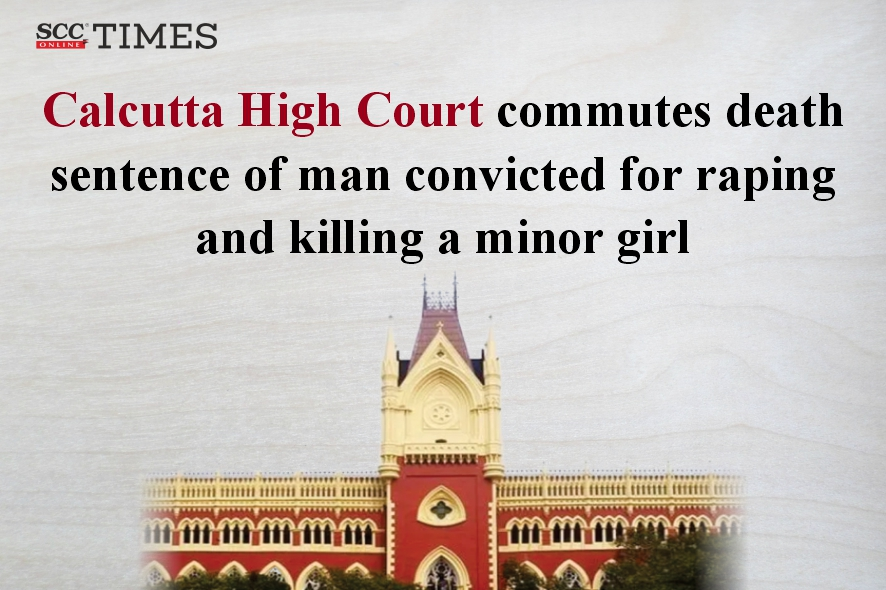Calcutta High Court: In a criminal revision application filed for commutation of death sentence of the appellant, who was convicted for raping and killing a minor girl, the Division Bench of MD Shabbar Rashidi* and Debangsu Basak, JJ, opined that the death penalty should be resorted to in exceptional circumstances. Accordingly, the Court commuted the death sentence of the appellant to life imprisonment without remission for 20 years.
Background
The appellant had been convicted by the Sessions Court for offences punishable under Sections 376(2)(i)(k), 302 and 201 of the Penal Code, 1860 (IPC) and Section 6 of the Protection of Children from Sexual Offences Act, 2012 (POCSO), and was sentenced to death for the same.
The victim was aged 14-15 years at the time of commission of offence and had been working in the appellant’s house as a maid for over two years. The de facto complainant was the maternal uncle of the victim who was informed by the appellant via telephone that the victim was seriously ill. The complainant, along with the mother of the victim, rushed to the appellant’s house. They couldn’t find her in any of the rooms of the house and ultimately found her lying dead in the bathroom. Her body was entirely charred and the complainant suspected that she had also been raped by the appellant.
Accordingly, a complaint was registered at Haldia Police Station. The police registered an unnatural death case, and on completion of investigation, submitted charge sheet in the case under Sections 376 (2)(i) (k)/302/201 of IPC and Section 6 of POSCO.
Analysis, Law, and Decision
The Court relied on the testimony of the autopsy surgeon and the post-mortem report to conclude that the cause of death of the victim was throttling ante mortem. The Court further noted that the victim was burned post-mortem and was the prey of repeated rape. According to the Court, the evidence led at the trial made it clear that the victim was repeatedly raped, killed by throttling, and finally set ablaze in an endeavor to annihilate the evidence.
The next point of consideration for the Court was to determine who was responsible for those actions. The Court noted that the victim and the appellant lived alone in his house and as per the terms of Section 106 of the Evidence Act, 1872, the appellant was under the obligation to explain the circumstances of the victim’s death. However, the appellant did not attempt to discharge that obligation, which led to an adverse inference against him.
In light of the evidence adduced at trial, the Court opined that the appellant alone was the perpetrator of the crime. The Court stated that the chain of circumstances was complete and neatly woven to exclude the intervention of anybody other than the appellant in the commission of the offence. Accordingly, the Court did not think it fit to interfere with the trial court’s judgement and upheld the appellant’s conviction.
With regards to the death penalty, the Court referred to Supreme Court pronouncements which had held that death penalty should be resorted to only in the ‘rarest of rare case’. The Supreme Court had also laid down certain parameters for determining ‘aggravating circumstances’ and ‘mitigating circumstances.’ Keeping those in mind, the Court noted that the appellant was 58 years of age and did not possess any criminal antecedent. He neither suffered from any pathological infirmity nor did he have a history of unstable mental or social behavior.
In light of the facts and circumstances presented before it, the Court commuted the death sentence awarded to the appellant to one of life imprisonment. The Court also clarified that since the appellant is aged, the punishment of life imprisonment in his case meant imprisonment for life without remission until 20 years from the date of his arrest.
[Srimanta Tung v. State of W.B., 2025 SCC OnLine Cal 5225, decided on 24-6-2025]
*Judgement authored by- Justice MD Shabbar Rashidi
Advocates who appeared in this case:
For the Petitioner: Kaushik Gupta (Senior Advocate), Santanu Talukdar, Advocate.
For the Respondent: Debasish Roy (PP), Rudradipta Nandy (APP), Suman De, Advocate.




